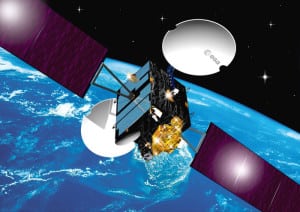Latest News
[Via Satellite 03-30-2015] British satellite operator Avanti is launching two new programs in Africa in partnership with the United Kingdom Space Agency through the International Partnership Space Program (IPSP). Additionally, TS2 Satellite recently launched Africa-focused Ka-band satellite services from Avanti’s Hylas 2 satellite, making Africa an even larger focus for the company.
Supported by the IPSP, Avanti is spearheading the U.K. industry’s role in the Satellite-Based Augmentation System for Africa (SBAS-Africa) project, which is underway to speed the implementation and use of flight operations based on Global Navigation Satellite Systems (GNSS). South Africa is playing a significant role in advancing the system, with support from the South African Space Agency (SANSA), and the South African Air Traffic and Navigation Services Company (ATNS). Additional partners include NSL, TAS UK, the Ghana Council for Scientific and Industrial Research, and the Agency for Aerial Navigation Safety in Africa and Madagascar (ASECNA).
The purpose of IPSP is to foster relationships with nations lacking extensive experience in the regular use of space or satellite technology. The hope is that by creating partnerships, these nations will work closely with the U.K. and U.K.-based companies to normalize their use of satellite technology in everyday life. This in turn would help partner nations advance while also boosting the U.K. on its goal of growing its percentage of the global space economy to 10 percent by 2030.
SBAS-Africa will leverage Avanti’s L1 navigation transponder on the Artemis satellite, which the company won in a competitive bid from the European Space Agency (ESA) in late 2013. According to Avanti, Artemis has enough fuel to continue operating until the end of 2016 at minimum, with reserves sufficient for deorbiting. The spacecraft has coverage of Africa, Europe and a large swath of Asia.
Avanti’s second IPSP award is for a remote education project in Tanzania. In collaboration with partners Camara Education Tanzania, a Non-Governmental Organization (NGO) and Infinity Africa Network, an Internet Service Provider (ISP), the operator will provide Ka-band satellite connectivity to as many as 250 schools. The initiative, known as the iKnowledge program, brings Information and Communications Technology (ICT) to rural and remote areas.
“Together we will ensure the measurable outcomes of iKnowledge on the teaching community and broader community around these schools will have a meaningful and long lasting impact for all,” Keith Magee, senior education specialist at Camara, said in a statement. The one-year program provides satellite broadband, ICT training and educational content for teachers.
Separate from the IPSP contracts, Avanti customer TS2 Satellite recently launched new high-speed broadband services in Iraq, Syria and Armenia. TS2 Satellite began the service based on iDirect technology, and customers are able to make use of smaller antennas associated with Ka band.
“[The] new service allows downlink speeds up to 20 Mbps, five times the previous maximum, using a smaller antenna. Higher performance is gained at a much lower cost, which allows up to four times higher connection speed at the same cost — if compared to previous Ku-band service — without compromising connection reliability and stability,” Marcin Frąckiewicz, CEO and founder at TS2 Satellite, said in a statement.
Together these deals offer strong opportunity for Avanti to continue expanding in Africa. According to the company, a EU co-funded study on European Geostationary Navigation Overlay Service/SBAS services in South and Southern Africa found a potential economic benefit of more than $2.5 billion. There are also an increasing number of satellite-enabled remote education projects surfacing, and the addition of new customers bolsters Avanti’s already fully-funded expansion plans. The company has more capacity coming online in the form of the Hylas 3 payload in 2016 and the Hylas 4 satellite in 2017.
Get the latest Via Satellite news!
Subscribe Now